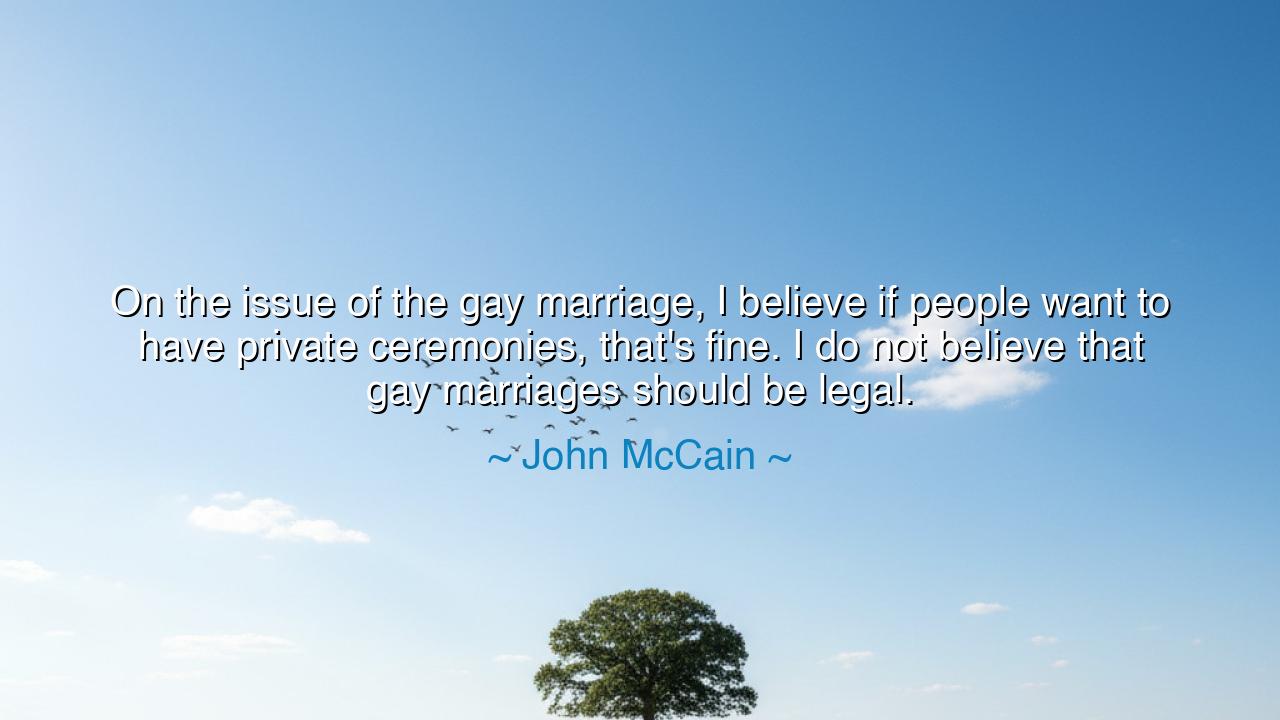
On the issue of the gay marriage, I believe if people want to
On the issue of the gay marriage, I believe if people want to have private ceremonies, that's fine. I do not believe that gay marriages should be legal.






The words of John McCain, “On the issue of the gay marriage, I believe if people want to have private ceremonies, that's fine. I do not believe that gay marriages should be legal,” arise from a time of great moral division and cultural transformation in the American spirit. They are spoken not with malice, but with the cautious conservatism of a man bound to the traditions of his age — one who, though honorable and steadfast, stood at the crossroads between custom and change. In these words, McCain reflects the struggle of a generation wrestling with the meaning of marriage, law, and freedom, striving to preserve what it knew while uncertain of what the future demanded. His statement is both a window into the past and a mirror to the eternal conflict between principle and progress.
The origin of this quote lies in McCain’s public stance during the early 2000s, when the question of same-sex marriage ignited the conscience of the nation. At that time, the United States was deeply divided — some feared that changing the definition of marriage would erode the moral foundations of society, while others believed that denying such unions was a denial of human dignity itself. McCain, a man molded by the traditions of his military upbringing and his devotion to order and service, believed that law should preserve the structure of the family as it had been understood for centuries. To him, the sanctity of marriage was bound to its traditional form — the union of man and woman — while private affection and ceremony were matters of personal liberty, but not of legal recognition.
And yet, the tides of time are relentless. Just as the ancients once clung to their certainties — the belief that kings ruled by divine right, or that slavery was a natural order — so too did societies in every era face the painful shedding of old laws to make room for greater truths. McCain’s words, spoken in sincerity, came at the dawn of a transformation he could not yet embrace. For history has shown that even the most noble hearts can stand on the wrong side of progress, not from cruelty, but from caution. The philosopher Plato once warned that law is like a fortress — it must be strong, but if it does not open its gates when justice demands, it becomes a prison. So it was that, years after McCain’s statement, those gates would open — when the Supreme Court, in Obergefell v. Hodges (2015), declared that the right to marry is fundamental to all people, regardless of gender.
But let us not condemn McCain too swiftly. For even in his opposition, there lay a measure of tolerance — the acknowledgment that love may exist privately, even if not sanctified by the state. This distinction, though imperfect, reflected a cautious compassion: an attempt to balance personal conscience with the pull of modernity. He was a man of duty, guided by the belief that law must preserve order, not disrupt it. And yet, in the long sweep of history, law must also serve the deeper order of justice — the truth that every soul, created equal, deserves not only respect in private, but recognition in public. The journey from McCain’s view to the triumph of equality was not a rejection of his courage, but the evolution of his nation’s understanding of freedom.
The story of this transformation echoes that of Emperor Constantine, who once legalized Christianity after centuries of persecution. The empire had long feared that recognizing this faith would weaken its traditions; yet, in doing so, Constantine opened the path to a new moral order. Likewise, the legalization of same-sex marriage was not the collapse of society, as some feared, but its renewal — a redefinition not of morality, but of inclusion. Every generation must decide whether it will guard the walls of its old certainties or open the gates to new forms of truth. McCain, though he stood guard in his time, became part of a nation that eventually opened those gates — not through violence or revolt, but through the quiet insistence of love.
There is a lesson in this: that conviction and compassion must walk together, and that even when we disagree, we must seek to understand the roots of another’s belief. McCain’s stance teaches us not to scorn those who fear change, but to guide them with patience, showing that justice does not destroy what is sacred — it reveals its fuller meaning. For the essence of marriage has never been in its legality alone, but in the promise of two hearts to share life’s burdens and joys. When the law finally reflected that truth, it did not erase the past — it redeemed it.
So let these words be passed down as both a warning and a blessing: every age believes it guards the truth, but time reveals a greater one. The duty of the wise is not to fight against the flow of justice, but to help steer it with courage and grace. For the world does not change through anger, but through understanding. And when law and love finally walk hand in hand, then, and only then, does a nation fulfill its destiny — not merely as a place of freedom, but as a home for the dignity of all.






AAdministratorAdministrator
Welcome, honored guests. Please leave a comment, we will respond soon